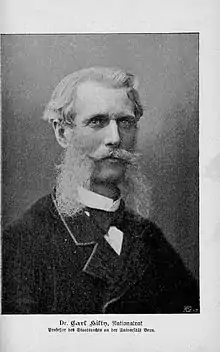Carl Hilty
Carl Hilty (28 February 1833 – 12 October 1909) was a Swiss philosopher, professor, politician, writer, and lawyer. He famously said: "Peace is only a hair's breadth away from war." Although a Christian, he was no pacifist, and expected the coming world war. He also served as a high officer in the Swiss Army. He was married to a German wife named Johanna Gaertner. Hilty was a spokesman for women's rights to vote and to be elected, several decades before the subject became mainstream. Hilty argued that Switzerland, as a nation-state comprising several nationalities and languages, had a unique mission of demonstrating that a nation-state could transcend tribal tendencies.[1]

Carl Hilty was born in Werdenberg, Switzerland, and studied at the Universities of Göttingen and Heidelberg. To improve languages and see the world, he also spent some time in London and Paris. He then began his work as a lawyer in Chur, where he lived for almost 20 years. In 1874, he became a professor of constitutional law (Staats- und Volkerrecht) at the University of Bern. From 1886, he edited Politisches Jahrbuch der schweizerischen Eidgenossenschaft (The Journal of Swiss Jurisprudence). In 1890, he became a member of the Nationalrat, the Swiss parliament.
Hilty's philosophical concern was practical in nature. He wrote about happiness, the meaning of life and work, developing good habits, time management, and winning the battles of life.[2] He became famous from his writings about happiness, which first appeared in three volumes in 1891, 1895 and 1899. These essays were eventually collected into a single volume entitled: "Happiness: Essays on the Meaning of Life". In this work, Hilty combines ancient stoic thought with Christian beliefs.[3] The work was translated into English by Prof. Francis Greenwood Peabody, Professor of Christian Morals at Harvard University, and first appeared in the United States in 1903.
Hilty supported the Salvation Army, which opened their services in Zurich. At first he made jokes about their noisy appearance, but only a few years later, he recognized them as one of the few groups who were able to put the words of Jesus in practice. Hilty was in his time one of the few intellectuals who still believed in the Gospel, while many other intellectuals dedicated themselves to the so-called "monastic" philosophy following the new sciences after Darwin. He believed in a new reformation beyond the dogmas of churches and politics, after the time of materialism.
Hilty's work influenced the thinking of William James.[4]
He died in Clarens in 1909.
Books
Academic:
- Theoretiker und Idealisten der Demokratie (Theorists and Idealists of Democracy), Bern, 1868
- Ideen und Ideale schweizerischer Politik (Ideas and Ideals of Swiss Politics), Bern, 1875
- Vorlesungen über die Politik der Eidgenossenschaft (Lectures on the Swiss Political System), Bern, 1879
- Ueber die Wiedereinfuhrung der Todesstrafe (On Capital Punishment), Bern, 1879
- Die Neutralität der Schweiz in ihrer heutigen Auffassung (The Neutrality of Switzerland), Bern, 1889
- (translated into French by Mentha, 1889)
- Das Referendum im schweizerischen Staatsrecht (The Referendum in Switzerland), Archiv für öffentliches Recht, 1887
- Der Burenkrieg (The Boer War), Bern, 1900.
Personal:
- Glück (Happiness ), 1891, (translated into Dutch by Eduard Fimmen, 1903) .
- Lesen und Reden (On Reading and Speaking), 1891
- Für schlaflose Nächte (For Sleepless Nights), 1901.
References
- Baycroft, Timothy; Hewitson, Mark (2006). What is a nation? : Europe 1789-1914 (1. publ. ed.). Oxford: Oxford University Press. p. 105. ISBN 0199295751.
- Carlin, Nathan; Capps, Donald (2012). 100 years of happiness insights and findings from the experts. Santa Barbara, Calif.: Praeger. ISBN 1440803633.
- Williams, Charles (2001). Adenauer the father of the new Germany. New York: J. Wiley. p. 33. ISBN 0471437670.
- Capps, Donald (2015). The Religious Life: The Insights of William James. Wipf and Stock Publishers. pp. 193–194. ISBN 1498219950.
External links
- Publications by and about Carl Hilty in the catalogue Helveticat of the Swiss National Library
- "Literary estate of Carl Hilty". HelveticArchives. Swiss National Library.
- Works by or about Carl Hilty at Internet Archive
- Works by Carl Hilty at Open Library
